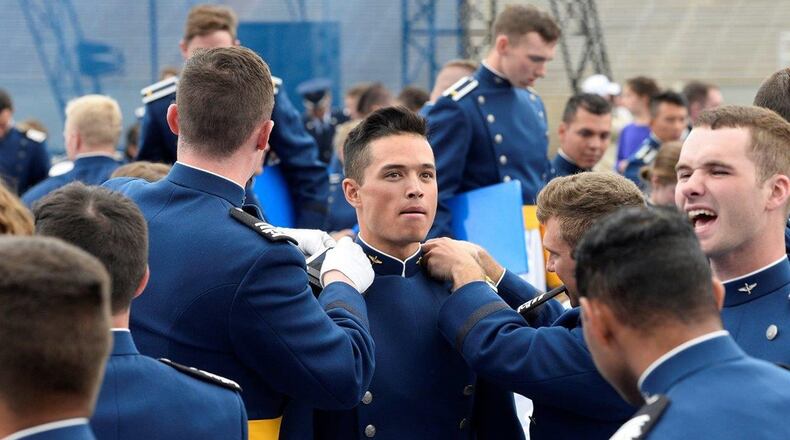Yet graduates of the Air Force Academy, who make up just a fraction of new officers, are conscious of the stereotypes glinting off the bright blue hardware they also wear, their Academy class rings, a clash of status symbols some cadets had to carry into their first duty assignments at Wright-Patterson Air Force Base this summer.
“I’m proud I went to the academy, but I think there’s sometimes a mindset among the enlisted world and other officers that academy grads think they’re better than everybody else because of where we went to school,” said 2nd Lt. Samantha Jackson, an F-15 division program manager at the Air Force Life Cycle Management Center and 2019 USAFA graduate. “I don’t think we’re better. I really want people to get a first impression of me before they realize where I’m from.”
Many cadets aspired to the academy after looking up at service members close to them. Several, including 2nd Lt. Jacob Ehrenstrom, a human factors engineer now with the Air Force Research Laboratory’s 711th Human Performance Wing, and 2nd Lt. Natalie Ketner, a new USAFA graduate and electrical engineering student at the Air Force Institute of Technology, named their military parents, a mind for STEM (science, technology, engineering and math) and a conviction to pay it forward to their country as influences that bent them toward USAFA.
“I wanted to serve because my dad served,” said Ketner, whose father was enlisted in the Army.
Graduates are quick to confess their readiness in one particular area lags far behind their ROTC and enlisted counterparts.
“That we don’t know how to “adult” isn’t really a misconception – it’s kind of true,” AFIT nuclear engineering student and new Academy grad 2nd Lt. Marcus Brinker said. “USAFA was a weird juxtaposition of expecting you to grow up and be Air Force officers but also checking to make sure you made it to that briefing at 7 on a Wednesday night.”
While cadets bear USAFA’s rigorous training during their four years, the academy lightens the load of everyday tasks so that the falcons can channel their effort further. Cadets are assigned roommates, dorms, schedules, meals, dress, daily habits and even their subsequent three-year home and job with little or no say but also little or no need for decision-making.
The disciplined and brainy second lieutenants explain that new autonomy now requires catching up on street smarts in both their personal lives and jobs.
“I think the hardest part is grocery shopping,” Jackson said. “And then you run out of groceries, and you have to go back and do it again. It’s a never-ending cycle of grocery shopping.”
“The academy required military duties, school, physical fitness and mandatory duties,” said Brinker. “Here your duty is to go to work or school and keep up with your fitness on your own time. That freedom to choose your own schedule every day has been a pretty cool experience.”
Brinker and the other young officers were sent to Ohio to schedule out the first stint of their truly adult lives. But after almost one-fifth of their lifespans trekking Colorado peaks and 60 force-financed days travelling the whole world from Iceland to Vietnam, many of the falcons were reluctant to land in Midwest farm crops.
“My impressions before I got to Wright-Patt was that it’d be out in the middle of a cornfield somewhere,” said Brinker. “I’d heard that there wasn’t a lot to do, and I’m finding that to be untrue so far. Dayton is a lot bigger than I expected.”
“It exceeded my expectations with the awesome nature right next door,” said Ketner.
The Colorado graduate discovered Ohio wildlife beyond farmland at places like John Bryant State Park, even jumping on a paddleboard for the first time.
Ehrenstrom, who competed on USAFA’s triathlon team, is excited to cycle on Miami Valley’s bike trails, and Brinker looks forward to the area’s frequent festivals.
The family atmosphere at Wright-Patterson has also set the lieutenants’ first assignments in a positive light, and the new officers are already finding wingmen to help them through the day-to-day.
“Most people in my office are my parents’ age or older,” said Jackson, “but that’s a blessing in disguise. If I need something or have a question, I can just go ask them.”
The officers are modest about their influence in the Air Force, but they’re already planning to share some of the time post-cadet life freed up with the community. Ketner hopes to continue judging and mentoring high school students at robotics events like she did in Colorado, and Ehrenstrom is interested in volunteering at the National Museum of the United States Air Force.
The officers’ small spaces in the Long Blue Line of USAFA alumni only make them more eager to reach up for help and out to assist Airmen who work under the same mission.
“I don’t know what I can bring here,” said Jackson, “but I’m hoping I can take away a lot and learn how to excel at my job.”
“I’m figuring this all out just like everybody else. I hope to work a lot with different people and professors and help out in whatever way I can. I want to make a positive impact around me,” said Ketner. “I think the best way to combat the negative perceptions is to earn our respect and to try not to let anyone down or be arrogant in any way. Hopefully we can fix it one person at a time.”
About the Author
